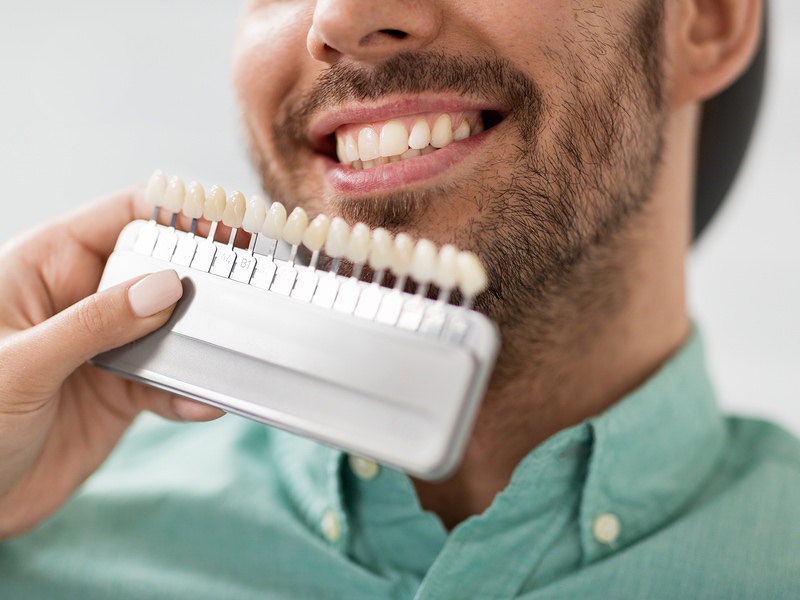 As a dental professional, I am always reminded of how important it is to take care of our teeth and gums. Not only do they help us to speak and eat, but they can also make a big impact on our overall health. One of the most common cosmetic concerns that patients come to me for is tooth discoloration. Whether it’s from aging, genetics, or lifestyle habits, everyone wants to have a bright, white smile. In this blog post, I’ll be discussing how your lifestyle choices can affect the color of your teeth, and what you can do to maintain a healthy, white smile.
As a dental professional, I am always reminded of how important it is to take care of our teeth and gums. Not only do they help us to speak and eat, but they can also make a big impact on our overall health. One of the most common cosmetic concerns that patients come to me for is tooth discoloration. Whether it’s from aging, genetics, or lifestyle habits, everyone wants to have a bright, white smile. In this blog post, I’ll be discussing how your lifestyle choices can affect the color of your teeth, and what you can do to maintain a healthy, white smile.
1. Food and Drink: The types of food and drink that you consume can have a major effect on the color of your teeth. Certain foods such as berries, beets, and tomato sauce contain pigments that can stain your teeth. Drinks such as tea, coffee, and red wine can also cause discoloration. If you enjoy consuming these types of foods and drinks, try to rinse your mouth with water after eating or drinking. This can help to prevent the pigments from settling on your teeth. Additionally, consider using a straw when drinking certain beverages to minimize contact with your teeth.
2. Tobacco Use: Whether you smoke cigarettes or use tobacco products, this habit can lead to yellowing of the teeth. Tobacco contains tar and nicotine, which can cause discoloration over time. Not only that, but tobacco use can also contribute to gum disease, which can lead to tooth loss. Quitting tobacco use is the best way to avoid these negative effects on your teeth and gums. If you’re struggling to quit, talk to your dentist for advice on resources and strategies that can help.
3. Oral Hygiene: Maintaining good oral hygiene is essential for keeping your teeth healthy and white. Brushing and flossing daily can remove surface stains and plaque buildup, which can lead to discoloration. Additionally, regular professional cleanings can help to remove more stubborn stains and tartar buildup. If you’re looking to brighten your smile even further, consider using a whitening toothpaste or getting an in-office whitening treatment from your dentist.
4. Medications: Certain medications can cause tooth discoloration as a side effect. This includes antibiotics such as tetracycline and doxycycline, as well as antipsychotic and antihistamine medications. If you’re taking a medication that you think may be causing discoloration, talk to your doctor or pharmacist about alternatives. Additionally, be sure to let your dentist know about any medications that you’re taking during your appointment.
5. Aging: As we age, our teeth naturally become more yellow or gray in color. This is because the outer layer of enamel on our teeth wears away over time, exposing the darker layer of dentin underneath. While this process cannot be stopped, there are steps that you can take to slow down the discoloration process. Maintaining good oral hygiene and avoiding tobacco use are two key ways to keep your teeth looking their best as you age.
In conclusion, there are many lifestyle factors that can affect the color of your teeth. By taking steps to maintain good oral hygiene, avoiding tobacco use, and being mindful of the foods and drinks that you consume, you can help to keep your teeth healthy and white. As a dental professional, I encourage you to speak with your dentist about any concerns that you may have regarding tooth discoloration. They can offer advice and guidance on the best strategies for maintaining a bright, healthy smile.
Contact Your Time Dental Urgent Care:
Locations: (Tap to open in Google Maps):
South Shore – Gibsonton
13145 Kings Lake Drive Ste 105B Gibsonton, FL 33534 Call: 813-519-0128
FishHawk – Lithia
5486 Lithia Pinecrest Rd, Ste B Lithia, FL 33547 Call: 813-519-0128
